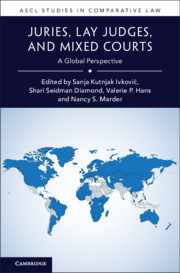Refine search
Actions for selected content:
25 results
Contracting Away Constitutional Rights in the United States: Adhesive Consent (Blanket Assent) to Arbitration and Other Agreements
-
- Journal:
- German Law Journal / Volume 26 / Issue 5 / June 2025
- Published online by Cambridge University Press:
- 05 November 2025, pp. 904-935
-
- Article
-
- You have access
- Open access
- HTML
- Export citation
Deciding without Deliberating: Voices from Brazilian Jurors
-
- Journal:
- Law & Social Inquiry , First View
- Published online by Cambridge University Press:
- 10 October 2025, pp. 1-32
-
- Article
- Export citation
Chapter 6 - The Scope of the Investigation
-
-
- Book:
- A Clinician's Brief Guide to the Coroner's Court and Inquests
- Published online:
- 14 November 2024
- Print publication:
- 21 November 2024, pp 27-33
-
- Chapter
- Export citation
Chapter 15 - The Roles of Advocates and the Jury in the Coroner’s Court
-
-
- Book:
- A Clinician's Brief Guide to the Coroner's Court and Inquests
- Published online:
- 14 November 2024
- Print publication:
- 21 November 2024, pp 70-74
-
- Chapter
- Export citation
6 - Human Psychology and Robot Evidence in the Courtroom, Alternative Dispute Resolution, and Agency Proceedings
- from Part II - Human–Robot Interactions and Procedural Law
-
-
- Book:
- Human–Robot Interaction in Law and Its Narratives
- Published online:
- 03 October 2024
- Print publication:
- 29 August 2024, pp 111-140
-
- Chapter
-
- You have access
- Open access
- HTML
- Export citation
Chapter 3 - Oratorical Ambiguity
-
- Book:
- Freedom and Power in Classical Athens
- Published online:
- 04 April 2024
- Print publication:
- 11 April 2024, pp 56-87
-
- Chapter
-
- You have access
- Open access
- HTML
- Export citation
Chapter 4 - Power and the Citizen
-
- Book:
- Freedom and Power in Classical Athens
- Published online:
- 04 April 2024
- Print publication:
- 11 April 2024, pp 88-135
-
- Chapter
-
- You have access
- Open access
- HTML
- Export citation
37 - Tort Law Decision-Making
- from Part V - Other Legal Decision-Making
-
-
- Book:
- The Cambridge Handbook of Psychology and Legal Decision-Making
- Published online:
- 22 February 2024
- Print publication:
- 29 February 2024, pp 567-581
-
- Chapter
- Export citation
14 - Judiciaries
- from Part II - Actors and Institution
-
-
- Book:
- The Cambridge Constitutional History of the United Kingdom
- Published online:
- 12 August 2023
- Print publication:
- 17 August 2023, pp 359-385
-
- Chapter
- Export citation

The Power of the Jury
- Transforming Citizens into Jurors
-
- Published online:
- 25 August 2022
- Print publication:
- 15 September 2022

Juries, Lay Judges, and Mixed Courts
- A Global Perspective
-
- Published online:
- 03 August 2021
- Print publication:
- 29 July 2021
1 - Introduction
-
-
- Book:
- Juries, Lay Judges, and Mixed Courts
- Published online:
- 03 August 2021
- Print publication:
- 29 July 2021, pp 1-22
-
- Chapter
- Export citation
16 - A Worldwide Perspective on Lay Participation
- from Part IV - Global Perspectives on Lay Participation
-
-
- Book:
- Juries, Lay Judges, and Mixed Courts
- Published online:
- 03 August 2021
- Print publication:
- 29 July 2021, pp 323-345
-
- Chapter
- Export citation
11 - Trials by Peers
- from Part III - Challenges to Lay Participation in Law
-
-
- Book:
- Juries, Lay Judges, and Mixed Courts
- Published online:
- 03 August 2021
- Print publication:
- 29 July 2021, pp 218-236
-
- Chapter
- Export citation
9 - Pierre Bayle
- from Part II - Conscience According to Major Figures and Traditions
-
-
- Book:
- Christianity and the Laws of Conscience
- Published online:
- 12 June 2021
- Print publication:
- 24 June 2021, pp 170-186
-
- Chapter
- Export citation
THE RATES OF JURY PAY AND ASSEMBLY PAY IN FOURTH-CENTURY ATHENS
-
- Journal:
- The Classical Quarterly / Volume 71 / Issue 1 / May 2021
- Published online by Cambridge University Press:
- 27 May 2021, pp. 119-134
- Print publication:
- May 2021
-
- Article
- Export citation
15 - American Indians, Crime, and the Law
- from Part IV - (Mis)Understandings
-
-
- Book:
- Reading American Indian Law
- Published online:
- 11 December 2019
- Print publication:
- 12 December 2019, pp 357-380
-
- Chapter
- Export citation
7 - Tales of Judging
- from Part IV - Dies Iræ: Judge and Jury
-
- Book:
- Felony and the Guilty Mind in Medieval England
- Published online:
- 18 July 2019
- Print publication:
- 01 August 2019, pp 245-269
-
- Chapter
- Export citation
8 - The Mind and Comportment of Judge and Jury
- from Part IV - Dies Iræ: Judge and Jury
-
- Book:
- Felony and the Guilty Mind in Medieval England
- Published online:
- 18 July 2019
- Print publication:
- 01 August 2019, pp 270-302
-
- Chapter
- Export citation
Conclusion
-
- Book:
- Felony and the Guilty Mind in Medieval England
- Published online:
- 18 July 2019
- Print publication:
- 01 August 2019, pp 303-311
-
- Chapter
- Export citation
